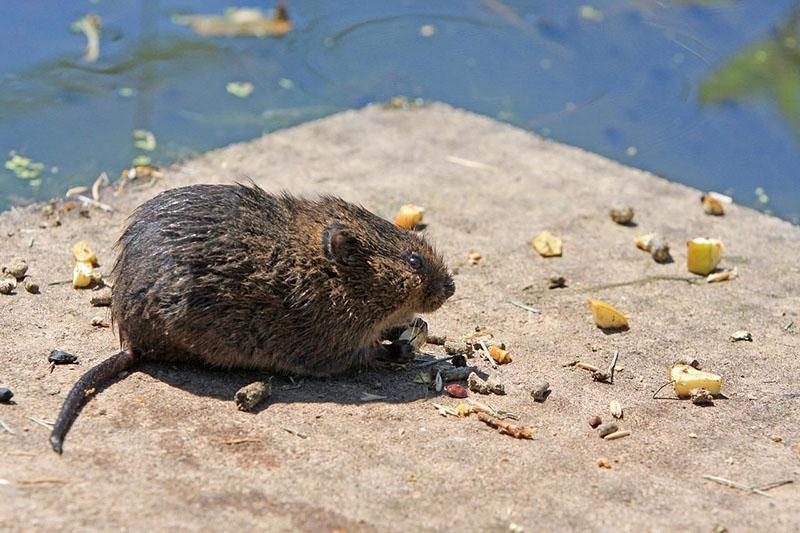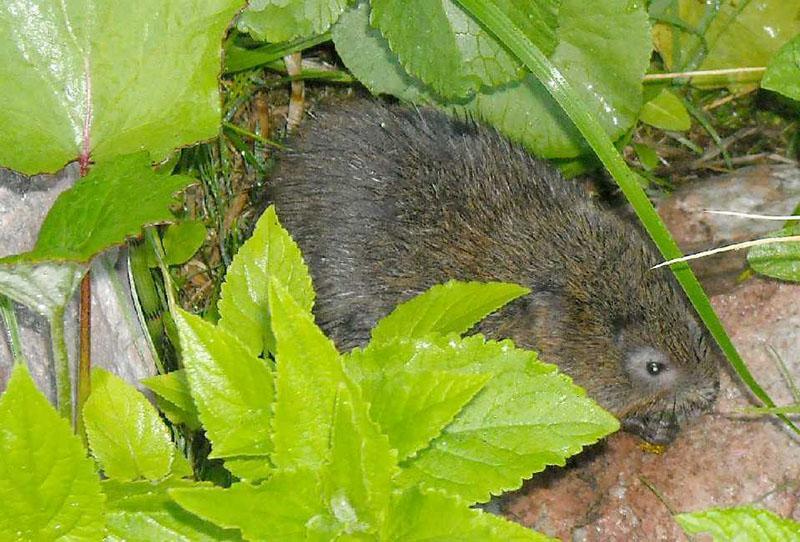How to deal with a water vole using effective methods of getting rid of a rodent in the area
 Owners of private houses and summer cottages located near rivers, lakes and other bodies of water often encounter uninvited "guests" - water voles. These small, but very intelligent rodents cause serious harm to the crop, so summer residents and gardeners need to know how to deal with a water vole, which folk and industrial remedies are most effective against this pest.
Owners of private houses and summer cottages located near rivers, lakes and other bodies of water often encounter uninvited "guests" - water voles. These small, but very intelligent rodents cause serious harm to the crop, so summer residents and gardeners need to know how to deal with a water vole, which folk and industrial remedies are most effective against this pest.
Description and features of the rodent

Features of the rodent's appearance:
- The body length of the vole reaches 20-25 cm, weight - up to 300-400 g. The body is dense and strong.
- The body of the rodent is covered with thick and shiny wool of brown, black or silver-gray color.
- A distinctive feature of the water vole is a long and thin tail, equal to 1/3 of the body size.
 Voles prefer to live near water bodies, in areas rich in food. These are various meadows, fields, orchards and vegetable gardens. Rodents lead a colonial life. At the same time, due to rapid reproduction, the size of the flock is rapidly increasing and can number several tens of individuals.
Voles prefer to live near water bodies, in areas rich in food. These are various meadows, fields, orchards and vegetable gardens. Rodents lead a colonial life. At the same time, due to rapid reproduction, the size of the flock is rapidly increasing and can number several tens of individuals.
Rodents are nocturnal. They get out of their burrows only late in the evening or at night to search for food. Among what the water rat feeds on are roots, shoots and green parts of garden plants, buds, flowers, foliage and bark of young fruit trees.
Water vole damage
 The fight against voles in the backyard should begin immediately after the first signs of rodent habitat are detected.
The fight against voles in the backyard should begin immediately after the first signs of rodent habitat are detected.
A rapidly multiplying rat colony causes serious harm to the garden, vegetable garden, field or pasture:
- Rodents burrow through vegetable gardens and agricultural fields, gnawing at plant roots. As a result, they dry out and wither.
- Water voles that have settled on hayfields and pastures quickly destroy all herbaceous plantations.
- Rodents reduce the yield of root crops by 40-50%. They feed on large carrots, beets and potatoes, and transfer small roots to burrows.
- Voles gnaw the bark of fruit trees and shrubs, which leads to their illness and death.
- In case of lack of food in the field, in the garden or in the garden, rodents can make their way into barns and cellars, destroying the grain of the harvested crop of vegetables and fruits.
 Every summer resident and gardener should know how to get rid of a water rat on the site, because this small animal is a carrier of dangerous diseases. It can infect a person with plague, tularemia, fever, leptospirosis, or encephalitis.
Every summer resident and gardener should know how to get rid of a water rat on the site, because this small animal is a carrier of dangerous diseases. It can infect a person with plague, tularemia, fever, leptospirosis, or encephalitis.
How to deal with water voles
 There are various methods of dealing with a water rat - biological, physical, folk remedies and chemicals. Each of these methods has its own subtleties and characteristics. Many gardeners and gardeners prefer biological control. Its essence lies in creating conditions on the site that are unsuitable for the life of water voles.
There are various methods of dealing with a water rat - biological, physical, folk remedies and chemicals. Each of these methods has its own subtleties and characteristics. Many gardeners and gardeners prefer biological control. Its essence lies in creating conditions on the site that are unsuitable for the life of water voles.
The main methods of biological control:
- planting plants next to the beds, fruit and berry trees, the smell of which scares away rodents - tansy, wormwood, peppermint or chamomile;
- the aisles can be sprinkled with wood ash, which the animals cannot tolerate;
- the soil between the beds and trees can be watered with gasoline, naphthalene solution, kerosene or acetone.
 It is also considered an effective way to attract natural enemies of water voles to the site - these are birds, cats, dogs of some breeds (terriers, dachshunds). But this method also has its drawbacks. In pursuit of animals, dogs break holes, causing even more damage to the backyard. In addition, natural enemies can exterminate only individual pests; they will be powerless against an entire rat colony.
It is also considered an effective way to attract natural enemies of water voles to the site - these are birds, cats, dogs of some breeds (terriers, dachshunds). But this method also has its drawbacks. In pursuit of animals, dogs break holes, causing even more damage to the backyard. In addition, natural enemies can exterminate only individual pests; they will be powerless against an entire rat colony.
Traditional methods
 One of the most popular and effective ways to deal with water voles is the use of simple folk remedies.
One of the most popular and effective ways to deal with water voles is the use of simple folk remedies.
The most effective remedies include:
- Burnt wool - a burnt piece of old wool must be thrown into a rodent burrow. They cannot stand her smell and will try to leave their home as soon as possible.
- Ash - this substance is a caustic alkali, which, when spilled onto the ground, adheres to the legs of water voles and causes severe intoxication. An additional plus - ash effectively fertilizes the soil in the garden and in the garden.
- Black Elderberry - The root system of the bush contains special cyanides. They saturate the soil with substances with a specific aroma that water voles cannot tolerate.

Needles are considered an effective folk remedy for fighting water voles. The surface of the soil and the trunks of fruit trees can be sprinkled with branches of juniper, pine or spruce. When running, the rodents injure their paws on the needles - this scares them and they leave the backyard.
Use of scarers
 In specialized stores for gardeners and gardeners, there is a wide range of ultrasonic repellents designed to combat water voles and other rodents.
In specialized stores for gardeners and gardeners, there is a wide range of ultrasonic repellents designed to combat water voles and other rodents.
Ultrasonic scarers are of two types - for use in underground and aboveground space. Only underground devices are suitable for fighting water voles, since the animals spend most of the day in their burrows and only at night go in search of food.
The radius of action of scarers, depending on the model, is 10-18 m. Such devices can operate on sunlight, rechargeable batteries or batteries.
The main advantages of scarers:
- the device affects not only water voles, but also other underground inhabitants - slugs, moles;
- this method is humane - rodents do not die, but leave the backyard;
- ease and ease of use of the device;
- long service life;
- safety for human and animal health.
But ultrasonic scarers have several disadvantages. Together with rodents, worms and other beneficial insects also leave the territory of the site. In addition, after turning off the device, water voles can return to their burrows.
Chemicals
 Among the ways how to deal with a water rat in the garden is the use of chemicals and industrial poisons. Such funds have a huge number of disadvantages, therefore, it is recommended to resort to their help only with extensive colonies of water voles in the backyard.
Among the ways how to deal with a water rat in the garden is the use of chemicals and industrial poisons. Such funds have a huge number of disadvantages, therefore, it is recommended to resort to their help only with extensive colonies of water voles in the backyard.
The main disadvantages of using chemicals:
- exceeding the dosage of industrial poison can lead to intoxication of fertile soil, crops, people and animals;
- rodents who ate the poisoned bait die in burrows and other hard-to-reach places, provoking an unpleasant smell of falling on the site;
- the summer resident needs to independently collect and dispose of the carcasses of dead rodents.
To combat rodents, drugs are used based on arsenic or phosphorus and zinc compounds.
In most cases, these are rodenticides in powder form. These include drugs Storm, Nutcracker, Rat Death, Zernocin, Efa. They are laid inside the bait.
To make the bait, you can cut an apple or other fruit, cut out the middle and pour a poisonous powder inside. After that, fasten both halves with a toothpick and leave them near the place where the rodents were seen.
Traps
 To combat water voles, you can use various traps and traps - both store-bought and made with your own hands. These can be ordinary rat traps or mouse traps, boxes or buckets with bait (cut root vegetables, it is possible with a chemical poison inside).
To combat water voles, you can use various traps and traps - both store-bought and made with your own hands. These can be ordinary rat traps or mouse traps, boxes or buckets with bait (cut root vegetables, it is possible with a chemical poison inside).
Traps are placed near burrows of water voles or places where they have been seen. In specialized stores, you can buy traps on springs with a suffocating effect or an electric discharge.
Traps for minks and ferrets are good options. Such devices are quite strong and reliable, they are focused on large animals. The bait is placed inside the trap - vegetables or fruits loved by water voles. It can be potatoes, carrots, beets.
Water voles are frequent "uninvited guests" on their backyards located near water bodies. The fight against rodents should be started immediately after their appearance, as they cause significant harm to the harvest of vegetables and fruits. To get rid of the animals, you can use both folk remedies and poisonous chemicals, traps and repellents. Each of these methods has its own characteristics, advantages and disadvantages.